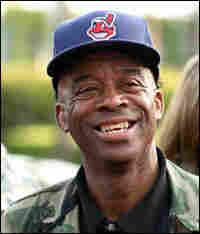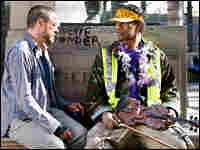The Soloist': Living With Mental Illness On Skid Row - NPR
Last of a three-part series

Nathaniel Ayers arrives at the premiere of The Soloist, the movie inspired by his life. Alberto E. Rodriguez/Getty Images

Steve Lopez (left, played by Robert Downey Jr.) and Nathaniel Ayers (Jamie Foxx) develop a unique friendship in the movie, The Soloist. Courtesy DreamWorks

Rapper General Jeff Page offers a narrated tour of his neighborhood.
The movie The Soloist is the story of a gifted musician named Nathaniel Ayers whose mental illness drove him from the halls of The Juilliard School in New York to the streets of Los Angeles. There, he developed an unlikely friendship with Los Angeles Times columnist Steve Lopez.
They met by chance four years ago on a downtown sidewalk near Pershing Square. Ayers was playing a violin with just two strings.
"He made sure to play where he could see Beethoven at all times," Lopez says, referring to a statue of the composer that was erected in Pershing Square to memorialize the city's old concert hall.
In the film, Ayers (played by Jamie Foxx) looks at the statue with awe.
"It really blows me away that someone as great as Beethoven is the leader of Los Angeles," he whispers.
Lopez (played by Robert Downey Jr.) is about to walk away, when he notices some names Ayers has chalked on a pillar.
"Those were my classmates at Juilliard," says Ayers.
That got Lopez's attention. He began writing columns about Ayers that turned into a book that turned into the movie. They tell the story of Nathanial Ayers' painful slide from a young musician full of promise to a man isolated by mental illness, sleeping on the sidewalk each night with hundreds of others. Through it all, Ayers' passion for music endured, says Lopez.
"All he cares about is the moment and the music," he says. "It's peace for him, it's sanity, he's home."
Readers were so moved by Ayers' story, they sent Lopez replacements for that two-stringed violin. Lopez takes a mental inventory: "Let's see, there are the six violins — five donated by readers — the two cellos donated by readers, the piano donated by a nurse. I bought him a number of instruments: a trumpet, a French horn, a clarinet, a viola."
LAMP Community
That collection is the reason that there's now a music studio at the LAMP Community, a Skid Row organization that works with the homeless mentally ill. After a lot of effort and patience, Lopez persuaded Ayers to move off the street and into a small apartment at LAMP. He's become a well known figure to other LAMP residents, such as Joseph DeGuerra.
"He's played music for me," DeGuerra says enthusiastically. "He knows my name and he usually has my name on the wall in his little corner over there."
DeGuerra points to a courtyard wall where Ayers has written dozens of names that are important to him, including Lopez and Yo Yo Ma, the world-renowned cellist and Ayers' classmate at Juilliard.
Ayers is a humble guy, says DeGuerra. "You'd never know he had a movie about his life story."
Homeless And Mentally Ill
DeGuerra came to LAMP because he is homeless and bipolar. He thinks the two are related.
"I believe that had I acted when I was diagnosed, a lot of things I probably would have avoided. But because at the time they gave me the label I didn't want to receive it, I was in a state of denial," he explains. "I started to get depressed, and when you get depressed that's not good."
But in LAMP's courtyard DeGuerra is anything but depressed. The staff at LAMP really helped and he's thrilled to have a roof over his head.
"I'm happy, I'm happy," he says. "I mean, they understand your illness and they're very sensitive."
Casey Horan, the director of LAMP, is beams. "And what you said about ... getting housing, how that helps your mental health? Of course it does!"
"It helps to know that somebody cares," adds DeGuerra. "When you're homeless you're like forgotten. Here at the LAMP, they make you feel like somebody."
Horan says it's the people who work at LAMP who feel like the lucky ones "because we get to bear witness to people who make these amazing changes in their life, that most people don't get to see."
Judge Tynan's Court
Every other Monday, Judge Michael Tynan gets to see those changes as well. He holds a special court for people accused of nonviolent offenses who have both a mental illness and an addiction. Most of the defendants have spent time on Skid Row and some call it home.
Instead of putting these people behind bars, Tynan assigns them to a residential treatment program and scrupulously monitors their progress. Failure can mean jail. But that's rare.
Joyce Anderson is one of the stars of the program. At one of her periodic appearances in court, Tynan notes her progress: "You have overcome some great difficulties and I'm proud of you."
Anderson looks radiant as she leaves court, knowing how far she's come.
"I became mentally ill," she recalls, "bipolar schizophrenia. And I wasn't on my medication. I was homeless off and on for 20 years, sleeping on the street."
She was also addicted to cocaine. But with treatment, she says, she looks forward to getting up every day, "and being able to be responsible for myself."
No one knows exactly how many homeless people are both mentally ill and addicted. A survey in Los Angeles County found that at least half of the homeless say they suffer from a mental illness and at least 40 percent acknowledge an addiction to drugs or alcohol. Tynan says in L.A. County alone there are probably tens of thousands of people who qualify for this special court. "This problem is ... pretty close to overwhelming the criminal justice system."
In fact, there are so many mentally ill people in the L.A. County jail, Sheriff Lee Baca says he runs the nation's largest mental institution. Tynan's court can serve only 54 people, and there are thousands of people who struggle with the same problems as Joyce Anderson.
Nathaniel And Steve
And there are thousands of Nathaniel Ayers, too, says Steve Lopez. That was the reason for those columns. And the book. And the movie.
"I hoped that in humanizing Nathaniel, that it'd be a step toward beginning to de-stigmatize mental illness," he explains.
Meanwhile, Lopez and Ayers go to concerts, to the ballgame and speak on the phone frequently. Lopez says Ayers is developing a wider circle of friends.
"When I'm not getting many phone calls, it's often because Mr. Ayers has, um, some female companions at times," says Lopez, laughing. "I feel like a jilted lover and I want to say, 'Don't you love me anymore?'"
Their story, though, has only a qualified happy ending.
"I will not romanticize it," Lopez says. "I don't want to give ... the idea that he's cured or that I have any idea what's in store for us tomorrow. The illness doesn't go away. It's there, it's ugly, and sometimes turns him into a very nasty, offensive guy."
Being friends with Ayers still is not easy, says Lopez, but "it's been all the more rewarding because of the challenges."
Actually, Lopez insists that he's gotten more out of this friendship than Ayers has. That point may be debatable, but then real friendship isn't something you can ever measure.
Comments
Post a Comment